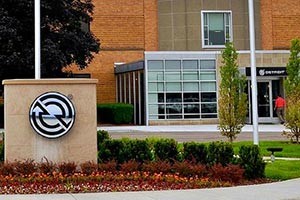Detroit Diesel to Pay $28.5 Million Over Clean Air Act Violations

Detroit Diesel Corp. will pay $28.5 million in fines and pollution-reduction projects to resolve violations of the federal Clean Air Act, the U.S. Justice Department and the Environmental Protection Agency announced Oct. 6.
The company was cited by the federal regulators for selling heavy-duty diesel engines that were not certified by EPA and did not meet applicable emissions standards. Detroit Diesel will pay a $14 million civil penalty and will spend $14.5 million on projects to reduce nitrogen oxides and other air pollutants, including replacing high-polluting school buses and locomotive engines with models that meet current emissions standards, the federal agencies announced.
Detroit Diesel began operations in Detroit in 1938 and manufactures engines, axles, transmissions, telematics and safety products for Freightliner and Western Star on-highway and vocational trucks, according to its website. It is an affiliate of Daimler Trucks North America, a wholly owned subsidiary of the German Daimler Group.
The government's complaint, filed Oct. 5 along with the settlement announcement, alleges that Detroit Diesel violated the Clean Air Act by producing and selling 7,786 heavy-duty diesel engines for use in trucks and buses in model year 2010 without a valid EPA-issued certificate demonstrating conformity with Clean Air Act standards to control nitrogen oxides, or NOx, emissions. The engines also didn't comply with emission standards for 2010 model year engines, the federal complaint alleges.
The school bus and locomotive engine replacement projects that are part of the settlement will reduce ambient air levels of nitrogen oxides and other pollutants, Justice and EPA officials said.
Dave Giroux, director of corporate communications for Daimler Trucks North America, said in an e-mailed statement that Detroit Diesel received an unexpected increase in customer orders for model year 2009 engines in the second half of 2009.
"To complete production of those engines in 2009, Detroit would have had to ramp up production by adding shifts," he said. "But because of the low number of orders for MY2010 engines, Detroit would have then had to lay off workers at the end of the year and run a skeleton shift for the first half of 2010."
Instead of interrupting its labor force, Detroit Diesel began assembly of the model year 2009 engines in 2009 and completed the engines in 2010, something it believed it was allowed to do under EPA regulations, Giroux said.
Using this “short block” assembly method, Detroit Diesel assembled about 80% of each engine in 2009, including the crankshaft, block, pistons,and connecting rods. The company then stored the short block engines temporarily and completed the remaining assembly in early 2010, he said.
Before beginning short block assembly, Detroit informed the EPA of its intent, Giroux said. But EPA officials later asserted that because the engines were completed in 2010, the short block engines should have met stricter 2010 standards, Giroux said.
"Ultimately, the EPA disagreed with Detroit’s interpretation of the regulations, but not until it was too late for Detroit to reverse course," Giroux said.
“While Detroit disagrees with the EPA’s position and was surprised to receive the EPA’s conclusion that its definition of ‘produced’ didn’t apply to our engines, to avoid litigation and stay focused on producing the most efficient engines in the market, Detroit has decided to settle with the EPA,” said Brian Burton, Detroit Diesel's general counsel, said in a statement.
Under the terms of the settlement agreement, EPA will release all of its claims of violations related to the short block engines in question and will not order their recall, Giroux said. In exchange, the company will spend $10.87 million to replace older, higher-emitting school buses across the country, with a special emphasis on economically disadvantaged school districts. Detroit Diesel also will spend $3.625 million to upgrade diesel locomotive engines, with a special emphasis on engines used in more polluted areas, he said.
Detroit Diesel was named a Green Leader for large businesses in Michigan by the Detroit Free Press last year, as decided by an independent panel of judges. The company was lauded for its efforts to improve efficiency and reduce pollution.
The case demonstrates the critical importance of EPA's vehicle and engine certification program to achieving the goals of the Clean Air Act, John Cruden, assistant attorney general for the Justice Department's Environment and Natural Resources Division, said in a written statement.
"By not certifying the engines in accordance with the rules, Detroit Diesel Corp. increased pollution and undercut competitors," he said. "We will uphold the integrity of that program by holding accountable those that skirt the rules.”
"Today’s settlement protects clean air for many communities and vulnerable people across the country, including school children," said Cynthia Giles, assistant administrator for EPA’s Office of Enforcement and Compliance Assurance. E"PA will continue to hold engine manufacturers accountable for meeting emissions standards that protect public health and the air we breathe."




